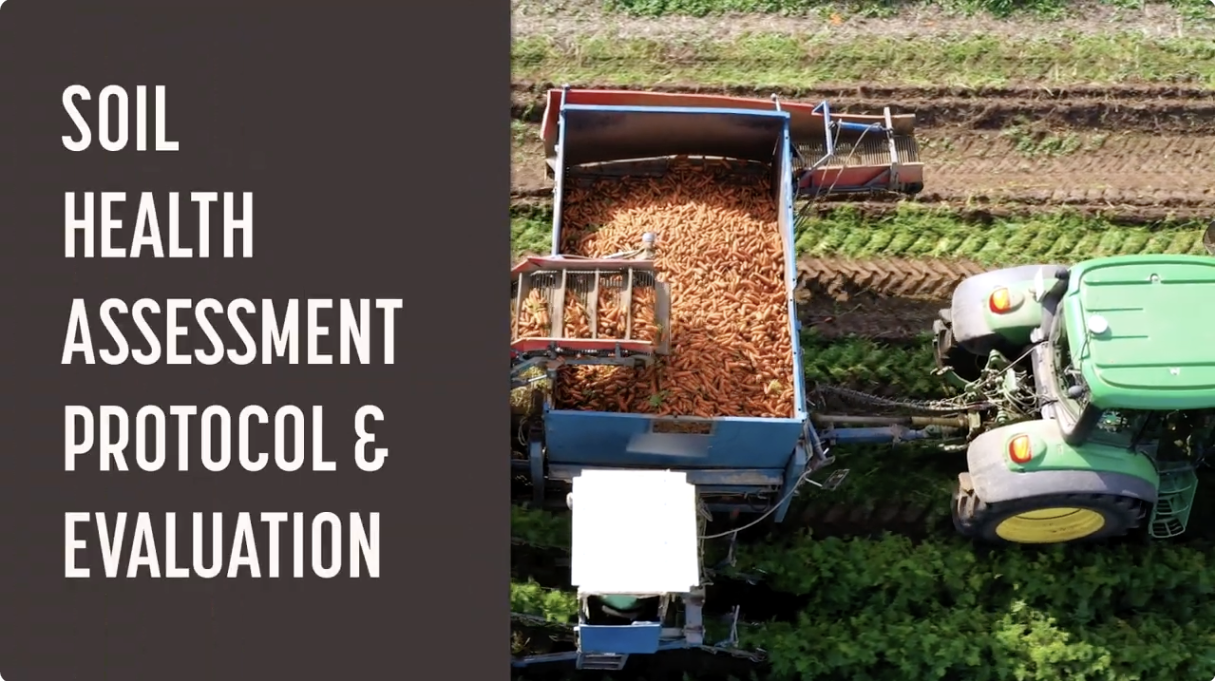Land Core Newsletter - April 2025
Photo by Ales Krivec on Unsplash+
Dear friends and colleagues,
Happy Spring!
Last month was a busy one. In addition to speaking engagements and conferences, Executive Director Aria Mclauchlan also traveled to Washington to meet with legislative offices, working to advance key Land Core priorities for the year. While news from DC can sometimes feel overwhelming, there are still consistent opportunities to champion soil health by highlighting the economic benefits for farmers, producers, and taxpayers alike.
Our recent meetings on our crop insurance proposal left us feeling encouraged, reminding us that cooperation and compromise are essential to creating healthier, more resilient communities and a thriving agricultural sector. By working together, we can ensure that soil health remains a shared priority—one that unites us all, regardless of politics.
Warmly,
The Land Core Team
Policy Updates
Read-out from Agri-Pulse Summit
Our first trip to Washington, D.C. in the new Congress was both promising and informative.
Aria attended the Agri-Pulse Ag & Food Policy Summit, where there was a robust discussion on “Taxes, trade, and technology”, themes that are looming large in the agricultural sector (and have downstream impacts on soil heath). It is clear these are the topics set to dominate federal food and farm policy over the coming months and occupy a significant amount of lawmakers’ bandwidth in D.C.
The day also featured a promising conversation on bipartisan support for preserving tax incentives related to clean fuels, such as the “45Z” credit for production of feedstocks for sustainable aviation fuel and other uses, which would incentivize and support producers in implementing soil health practices and rotate crops.
However, overshadowing all of this activity in Congress, is continued skepticism about the likelihood of a Farm Bill passing this year, despite a clear call from farmers and ranchers, as well as widespread support from industry and advocacy groups.
Land Core Policy Activities
On the Hill, Aria engaged with over a dozen congressional offices, including new members of the House Agriculture Committee, to explore opportunities to prioritize soil health and educate lawmakers on the risk-mitigating benefits of soil health practices.
We continue to champion common sense adjustments to crop insurance via key provisions of the Cover Crop Flexibility Act – originally introduced by Senator Thune and co-sponsored by Senator Stabenow – and initiated constructive early conversations with lawmakers in this new Congress. We highlighted the opportunity to establish a “Good Soil Health Discount” within the crop insurance program which was generally well received, especially for offices focused on improving the economic safety net for farmers.
We were also grateful for the opportunity to meet in person with several partner organizations and coalitions over the course of the week.
Farm Bill & New Congress Updates
Senate Chairs of the Agriculture Committee, Sen. G.T. Thompson and Sen. John Hoeven met last week to discuss plans to include key cuts and policy considerations from the Farm bill into the reconciliation bill. Programs like the Commodity Crops and crop insurance titles are being considered for cuts, mirroring the language of the farm bill text that had previously passed out of the committee last May. Over the weekend, the Senate approved a revised budget plan to advance tax policy and other provisions central to President Trump’s domestic agenda.
GOP lawmakers were successful in getting input (herbicides, pesticides, fertilizers, potash, etc.) exemptions for American farmers ahead of the global tariff rollout dubbed “Liberation Day” by the current administration. Despite this, producers of corn, soy, beef, cotton, rice, pork, and specialty crops brace themselves for the impact of export tariffs for years to come.
RFK takes his MAHA message on the road to mobilize state policies to support the removal of ultra-processed foods (UPFs) and food dyes from school lunch programs and to champion restrictions on purchasing sodas, candy, and other high calorie, nutrient deficient foods with SNAP benefits. Land Core is looking forward to continuing to develop our early conversations with HHS to better explore how soil health can be integrated into their work and how to best support our farmers to meet the goals HHS is laying out.
Sen. Chuck Grassley (R-IA) seeks to reestablish congressional power to restrain the president’s actions on tariffs. The bipartisan bill co-sponsored by Sen. Maria Cantwell (D-WA) requires Congress to be notified within 48 hours for opposition and any tariffs would need Congressional approval within 60 days to be enacted. While the bill is not likely to pass, the move shows growing unease by lawmakers in how these tariffs will impact the economy, and in particular the agriculture industry, in the long run.
Bill Tracker
We've added several new and reintroduced bills from the first quarter of the 119th Congress to the Bill Tracker!
This Congress is advancing legislation around several key themes which inform or otherwise impact soil health. Expansion of sustainable biofuels, improved monitoring for soil carbon sequestration, forest management and wildfire mitigation legislation are some of the overarching themes coming from this new Congress. So far, we’ve published:
30 new bills total
22 re-introduced bills
18 bipartisan bills
Keep an eye out for a dedicated Bill Tracker alert email in the coming weeks, where we’ll dive deeper into key legislation shaping the future of soil health. For previously introduced bills, our Analysis section now includes key updates and differences from earlier versions. We also have several more “secondary” bills in the pipeline to publish.
Stay up to date with our Bill Tracker Alerts, that you can sign up for here.
Announcement
We’re excited to welcome Phoebe Meyer to the Land Core Team as Policy Intern!
Phoebe Meyer earned a Bachelor of Science in Psychology from Tulane University, and minored in French. From her undergraduate and post-graduate work, Phoebe has three years of experience in psychology and public health research. Phoebe plans to apply to law school in the fall of 2025 to specialize in environmental law. In her spare time, she enjoys taking long walks with her dog, pilates classes, and watching classic films.
Upcoming Events
While the rush of agriculture’s winter conference season is behind us, there are still many opportunities for learning and connection. See below for a few upcoming events related to agriculture and soil health on our radar. You can also look for smaller, local (or online) events on NCAT-ATTRA’s calendar of events.
Saving America's Working Lands National Conference - April 23-25, 2025 | Dallas, Texas
A national conference hosted by American Farmland Trust, intended to meet growing demand for cutting-edge information about protecting and retaining U.S. agricultural land.
Northwest Latino Farmer Conference - May 7-8, 2025 | Wenatchee, Washington
The inaugural event, hosted by NCAT, will deliver the latest information about managing healthy soils, regenerative farming, business management, and more. Farmers can register for free!
Sustainable Agriculture and Food Systems Funders (SAFSF) Forum 2025
June 9-12, 2025 | Santa Ana Pueblo, New Mexico
The SAFSF Forum is a unique conference for the full spectrum of funders—including philanthropy, investors, community finance, and intermediaries—to engage with peers, movement leaders, and practitioners across the country around a shared mission for equitable and sustainable food and agriculture.
American Bankers Association - Risk and Compliance Conference 2025
June 10-13 | Indianapolis, Indiana
An advanced, consequential event for compliance and risk leaders. We bring you the best speakers in the industry, from seasoned and highly successful bankers to government representatives, lawyers, and consultants.
Funding Opportunities
Regenerative Farmer Assurance Fund (RFAF) - Round II
Healing Soils Foundation (HSF) is offering a second round of financial relief to organic and regenerative farmers facing delays in public funding from a newly created fund which offers recoupable grants (if the public funds later arrive). Midwestern producers with executed contracts for programs like EQIP, CSP, and RFSI can confirm their eligibility and fill out the interest form here.
Southern SARE Graduate Student Grant
The Southern Sustainable Agriculture Research and Education (SSARE) program is accepting Graduate Student Grant Program proposals up to $22,000. Research projects must cover issues related to improving the profitability of farmers/ranchers in the Southern region; sustaining and improving the environmental quality and natural resources base on which agriculture depends; or enhancing the quality of life for farmers and ranchers and the communities they support. Applications are due May 16, 2025.
AgWest Farm Credit New Producer Grant Program
This program provides $15,000 in start-up funds to successful applicants to support their agricultural ventures. Applicants must be at least 18 years old and a full- or part-time agriculturalist with two years or less of operational experience or have plans to start an operation within two years, within AgWest’s service area: Alaska, Washington, Oregon, Idaho, Montana, and portions of California, Nevada, and Arizona. The application deadline is May 31, 2025.
This flexible funding helps cover the upfront costs of installing USDA Environmental Quality Incentives Program (EQIP) practices. EQIP recipients in designated Midwest, Southeast, and Southwest states are eligible for specified conservation practices.
Farmer Opportunity
South Dakota Farmers Needed for a Nationwide Soil Health Project! See YouTube video here.
80 SD Farmers Needed for Nationwide Soil Health Project
The new nationwide project is called “Probing Our Country’s Soil Health” and is looking for 80 South Dakota farmers to participate. The project leaders are working to understand the status of soil health around the country and use that information to develop a new tool called Soil Health Assessment Protocol and Evaluation (or SHAPE). Once completed, the SHAPE tool can be used by farmers to better understand their soil health test results.
By Jesse Allen | April 3, 2025, American Ag Network
What We're Reading
State moves to slash cover crop funds despite rising demand
Gov. JB Pritzker has proposed a 31% funding cut to the popular Fall Cover for Spring Savings program, as part of overall proposed state budget cuts. By Jennifer Bamberg | April 3, 2025, myJournalCourier
Recipients of PCCP loans urge the Administration to safeguard this vital program, despite its name, emphasizing that its policies are closely aligned with the Administration’s goals of boosting agricultural investment in rural communities. Many signatories are already using PCCP funds to enhance soil health and build long-term farm resilience, having made significant upfront investments. Ongoing uncertainty about the program’s future threatens these efforts and undermines progress. March 28, 2025, Politico Pro
Can a new commission make America Healthy Again?
Public health experts offer impactful dietary recommendations known as drivers of chronic and metabolic dysfunction as priorities for MAHA in the fight against chronic disease. Gostin, L.O. et al., (2025). JAMA Health Forum. 2025;6(3):e251304. doi:10.1001/jamahealthforum.2025.1304
Using cover plants to remove pollutants from arable soil
Research Summarizes Results of Using Cover Crops for Phytoremediation. By Sharma P. et al | March 25, 2025, Helmholtz Center for Environmental Research
McDonald’s, McCain, and other corporates lead pilot to make regen farming ‘feel more achievable’
Corporates will participate in a regenerative farming pilot just launched by the UK's Sustainable Markets Initiative. By Jennifer Marston | March 24, 2025, Ag-Funder
Bee experts look for cause of massive honeybee dieoffs
Early numbers suggest that this winter’s loss in honeybee colonies could be the most significant in US history. By Krishna Ramanujan | March 20, 2025, Cornell Chronicle
New study takes long-term look at how biochar and hemp improve yields, crops
Scientists at Washington State University and partner institutions will explore how soil-boosting biochar and hemp affect important crops like wheat, corn and chickpeas in a new long-term study. By Seth Truscott | March 13, 2025, WSU Insider
Get Involved
🌱 Donate to Land Core! Support our programs to advance soil health in 2025 and beyond.
🌱 Sign up for our monthly newsletter.
🌱 Explore our Federal Soil Health Bill Tracker and sign up for monthly soil health legislation updates delivered to your inbox.




